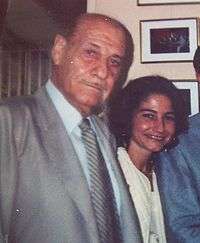Pompeo D'Ambrosio
Pompeo D'Ambrosio (1 January 1917, in San Marco Evangelista (near Salerno), Italy – 15 April 1998, in Caracas, Venezuela).

He was very renowned in the Italian community in Caracas and was very active - with his financial activity in one of the main Venezuelan banks ("Banco Latino") - for the promotion of many successful Italian entrepreneurs in Venezuela.
He was even a financial manager for Deportivo Italia, the soccer club of the Italian community in Venezuela, during the "golden" years (in the sixties and seventies). Those years, when he ruled the team with his brother Mino, are remembered as the D'Ambrosio Era.
Life
Pompeo D'Ambrosio lived his first years in Campagna, a little town in the Province of Salerno, where his uncle was the Municipal Major who distinguished himself helping the Jews during the Nazi persecution of Jews.[1]
In the late 1930s Pompeo D'Ambrosio studied "Administration of Italian Colonies" at the University of Naples.
During World War II he was a Lieutenant in the Italian Army in North Africa (Libya and Egypt), where he was wounded and taken as a POW during the Battle of El Alamein receiving a military Medal of Honor.
When he returned to Italy from an Allied Prisoner of War Camp in Egypt, in 1946 co-founded in Salerno the local section of the Movimento Sociale Italiano, a national-conservative Italian Party actually named Alleanza Nazionale.
Influence in the Italian community of Venezuela
In 1951 Pompeo D'Ambrosio moved to Venezuela, where started to work as Director of the "Banco Francés e Italiano" (called later "Banco Latino"),[2] financing the Italian community of Caracas, Maracaibo and Puerto La Cruz.
Many companies of Italian-Venezuelans, like "Vinccler" and "Constructora Delpre" (that made the skyscrapers of the Parque Central Complex, actually the tallest of South America), received his experienced advice and financial help in order to grow at the first levels of the Venezuelan economy.
He was even co-founder of the "Casa de Italia" and the "Centro Italo-Venezolano" of Caracas, and participated in many other associations for the health and social assistance of the Italians with low level income. He even promoted the diffusion of the Italian language in Venezuela.
Santander Laya-Garrido cites him, in his book "Los Italianos forjadores de la nacionalidad y del desarrollo económico en Venezuela" (The Italians creators of the nationality and the economic development of Venezuela), as an example of honesty and dedication to the community.[3]
His honesty made him to fight the growing but corrupted power of Pedro Tinoco (and his group called "Twelve Apostles") when he became President of the Banco Central de Venezuela. But in the eighties D'Ambrosio was forced to resign by Tinoco from the Banco Latino, a bank that was - soon after his resignation - involved in the biggest financial crisis of Venezuela.
When the Banco Latino went bankrupt in 1994, Pompeo D'Ambrosio received an outstanding applause (appeared on all the Venezuelan media) from the "Association of Employees of the Latino Bank", during a conference denouncing the corruption of Tinoco and his group (Siro Febres Cordero, etc..).[4]
Furthermore, Pompeo D'Ambrosio is mainly remembered by the Italian community of Venezuela because of his D'Ambrosio Era, when ruled with his brother Mino the Deportivo Italia (from 1958 to 1978, when soccer rose in prominence in Venezuela).[5]
The D'Ambrosio Era of the Deportivo Italia
In 1958 Mino D'Ambrosio took control of the Deportivo Italia and with his brother Pompeo D'Ambrosio (who financially controlled the team) made the soccer team of the Italian community reach the top level in Venezuelan football.
The D'Ambrosio Era of the team lasted twenty years until 1978 and was characterized by four championships of the Primera División Venezolana and the famous "Little Maracanazo" of 1971 (when the Deportivo Italia won in the Stadium Maracanã of Rio de Janeiro the Fluminense, Champion of Brasil). The team obtained even three times the Copa de Venezuela: in 1961, 1962 and 1970 (and was Runner-up in 1976). Furthermore, the team participated six times to the South American Copa Libertadores: in 1964, 1966, 1967, 1969, 1971 and 1972.
The sixties were the "golden" years of the Deportivo Italia, because they were Venezuelan Champions in 1961, 1963 and 1966. The fourth title for the team was obtained in 1972 (and was Runner-up in 1965, 1968, 1969, 1970, 1971).
Indeed, between 1961 and 1972, every year the Deportivo Italia of Pompeo and Mino D'Ambrosio obtained a first or second place in the Venezuelan Championships (and/or a good performance in the South American Copa Libertadores).
Additionally - in those golden years of the D'Ambrosio Era - the Deportivo Italia won in international tournaments some renowned European teams (like the Milan of Italy in 1968) and was the first Venezuelan team - in all the history of the Venezuelan soccer - to reach the second round of the Copa Libertadores (in 1964).[6]
See also
- Deportivo Italia
- Italo-Venezuelans
- Italian language in Venezuela
- D'Ambrosio Era (1958-1978)
- Little Maracanazo
References
- Campagna e gli ebrei di Monsignor Palatucci (in Italian)
- Vannini, Maria. Italia y los Italianos en la historia y en la cultura de Venezuela. pag.58
- Santander Laya-Garrido, Alfonso. Los Italianos forjadores de la nacionalidad y del desarrollo económico en Venezuela. pag 85
- TIME, 20 February 1995, BANKING: WE'RE ALL GOING TO PAY
- History of "Deportivo Italia" (in Spanish)
- Copa Libertadores 1964
Bibliography
- Briceño Javier. Un Sueño llamado Deportivo Petare. Universidad Catolica Andres Bello (Publicaciones y Tesis). Caracas, 2013 (Pompeo D'Ambrosio, p.33)
- Santander Laya-Garrido, Alfonso. Los Italianos forjadores de la nacionalidad y del desarrollo economico en Venezuela. Editorial Vadell. Valencia, 1978.
- Vannini, Maria. Italia y los Italianos en la historia y en la cultura de Venezuela. Oficina Central de Informacion. Caracas, 1966.
- Velásquez Ramón. J., Silva Carlos Rafael. El Ejecutivo Nacional y la Intervencion del Banco Latino. Talleres Gráficos de Joaquín Ibarra/Impresores. Caracas, 1994.
- Zapata, Juan Carlos. Dr. Tinoco. Vida y muerte del poder en Venezuela. Colección Claroscuro. Caracas, 2006.